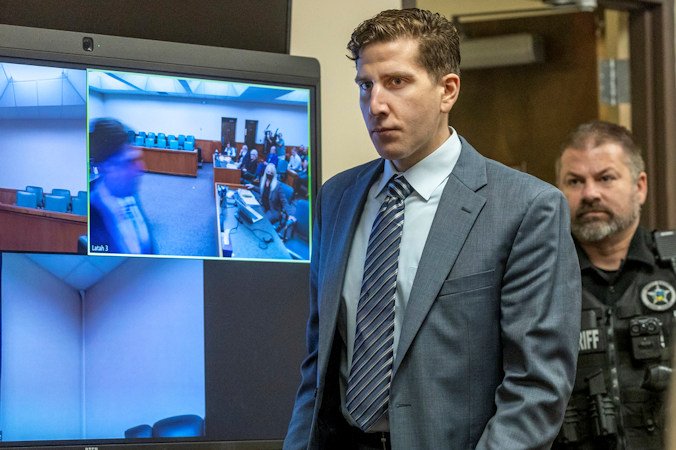Bryan Kohberger, charged in the slayings of 4 Idaho college students, wants cameras out of courtroom

By REBECCA BOONE
Associated Press
BOISE, Idaho (AP) — Attorneys for a man accused of stabbing four University of Idaho students to death late last year want cameras banned from the courtroom, contending that news coverage of the criminal proceedings has violated a judge’s orders and threatens his right to a fair trial.
Bryan Kohberger is charged with four counts of murder in connection with the deaths at a rental house near the university campus in Moscow, Idaho, last November. A judge entered a not-guilty plea on Kohberger’s behalf earlier this year. Latah County Prosecutor Bill Thompson has said he intends to seek the death penalty, and the case is scheduled for trial this fall, although it could be postponed.
Kohberger was a graduate student studying criminology at Washington State University, which is a short drive from the scene of the killings across the state border. He was arrested at his parents’ home in Pennsylvania, and the unusual details of the case have drawn widespread interest.
Second District Judge John Judge heard arguments over camera access Wednesday afternoon.
Kohberger’s defense attorney Jay Logsdon said the courtroom photos and videos have been misused, dehumanizing Kohberger and risking his right to a fair trial. He said the defense team is also concerned that the videos and photos could expose the private notes and records on the defense table, potentially revealing information that is protected under attorney-client privilege laws.
“The court, I think, understands our concern about turning this into a spectacle,” Logsdon said, and allowing photos and video “turns it into more of a TV show drama than a court proceeding.”
He acknowledged that news outlets and others would likely reuse older court images if cameras were banned, but said that would limit the novelty of the case.
“I don’t think we can underestimate the power of novelty,” Logsdon said, likening new photos from court to new internet memes that sometimes go viral. “Removing this almost ‘side-show’ from what’s being put out there, we think, would be an important way to try to take away the sensationalism of this case and hopefully reduce it to just the words on the page.”
Wendy Olson, the attorney representing a coalition of news media groups covering the case including The Associated Press, said the news organizations have carefully followed the judge’s orders about photos and videos in the courtroom. Video and photo coverage of the court proceedings dramatically increase public access and understanding about the case, she said, and Idaho’s rules about how cameras can be used in court already include tools to protect the right to a fair trial.
But 2nd District Judge John Judge appeared skeptical of that claim. The criminal case isn’t entertainment — it’s a tragedy, he said.
The pool camera operators are not the problem, he said, but the way the images are used by others is troubling.
“It’s where that film goes and how it is manipulated, and how people — commentators — how they talk about it, how they explain it. And a lot of times it is not very accurate,” he said. “This information, misinformation, is pumped out along with the images and the films. So how do we deal with that?”
The best approach is to ensure there are cameras in the courtroom so responsible news consumers and members of the public have a clear and consistent record of the facts, Olson said. Taking away that record means “talking heads” will be able to disseminate misinformation unchecked.
“The answer is not less sunshine, it’s more,” she said.
Judge said he was considering taking an approach that would be similar a the setup C-SPAN sometimes uses to cover Congress, with a camera staged at the back of the courtroom.
“Maybe that can just satisfy everybody, just partly,” Judge said. “I thought that might be a way to kind of give a little, and kind of protect what we’re trying to protect. I’ve never seen anything very sensational on C-SPAN.”
He said he would issue a ruling later, and that it would involve “a lot of balancing.”
“I’m going to try to figure out and do the right thing for both the public and the parties and the rule of law,” Judge said.
The bodies of Madison Mogen, Kaylee Goncalves, Xana Kernodle and Ethan Chapin were found Nov. 13, 2022, at a home across the street from the University of Idaho campus. Investigators pieced together DNA evidence, cellphone data and surveillance video that they say links Kohberger to the slayings.